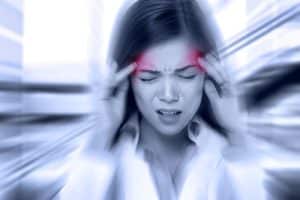More Than Migraines: Different Types of Headaches
January 9, 2019
Almost everyone has had a headache at some point in their life. For some, it’s a pretty rare, short-lived, inconvenient experience, but for others it is a common occurrence involving a throbbing pain, severe discomfort, and major distraction. You may automatically think about migraines, which are certainly a huge problem for many, but there are other types of headaches that can be very difficult to deal with as well.

7 Different Types of Headaches
- Tension headaches — Tension headache often cause a dull, aching sensation all over your head rather than throbbing. Tenderness or sensitivity around your neck, forehead, scalp, or shoulder muscles also might occur. These headaches are often triggered by stress, and anyone can get one. An over-the-counter (OTC) pain reliever may be all it takes to relieve your occasional symptoms.
- Cluster headaches — These are characterized by severe burning and piercing pain that happen in a series, or cluster. They occur around or behind one eye or on one side of the face at a time. Sometimes swelling, redness, flushing, and sweating can occur on the side that’s affected by the headache. Each individual headache can last from 15 minutes to three hours. Most people experience one to four headaches a day, usually around the same time each day, during a cluster. After one headache resolves, another will soon follow.
- Allergy or sinus headaches — Headaches can happen due to allergic reactions, and the pain is often focused in your sinus area and in the front of your head. People who have chronic seasonal allergies or sinusitis are susceptible to these kinds of headaches. Sinus headaches are treated by thinning out the mucus that builds up and causes sinus pressure. Nasal steroid sprays, OTC decongestants or antihistamines may help.
- Hormone headaches — Women commonly experience headaches that are linked to hormonal fluctuations. Menstruation, birth control pills, and pregnancy all affect estrogen levels, which can cause a headache. OTC pain relievers like naproxen (Aleve) or prescription medications like frovatripan (Frova) can work to control this pain.
- Caffeine headaches — Caffeine affects blood flow to your brain, and having too much or not enough can give you a headache. People who have frequent migraines are at risk of triggering a headache due to their caffeine use. When you’re used to exposing your brain to a certain amount of caffeine each day, you might get a headache if you don’t have it.
- Hypertension headaches — High blood pressure can cause you to have a headache, and this kind of headache signals an emergency. This occurs when your blood pressure becomes dangerously high. A hypertension headache usually has a pulsating quality and will occur on both sides of your head. It will typically be worse with activity. You may also experience changes in vision, numbness or tingling, nosebleeds, chest pain, or shortness of breath. If you think you’re experiencing a hypertension headache, you should seek immediate medical attention.
- Rebound headaches — Rebound headaches, also known as medication overuse headaches, can feel like a dull, tension-type headache, or they may feel more intensely painful, like a migraine. You may be more susceptible to this type of headache if you frequently use OTC pain relievers. Overuse of these medications leads to more headaches, rather than fewer. The only treatment for rebound headaches is to wean yourself off of the medication you’ve been taking. Although the pain may worsen at first, it should completely subside within a few days.
